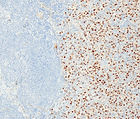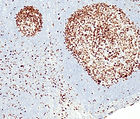Why You Should Choose Recombinant Primary Antibodies
The Advantages of Recombinant Rabbit Monoclonals
Recombinant rabbit monoclonals combine the best properties of both mouse monoclonal antibodies and rabbit polyclonal antibodies, therefore providing a broader diagnostic potential. Please see all advantages of our novel recombinant rabbit monoclonals.

Rabbit Vs Mouse
▶ High specificity and reduced risk of cross reactivity due to monoclonal nature
▶ High diversity due to superior antigen/epitope recognition
▶ Recognise antigens/epitopes that elicit a poor response in mice
▶ Improved immune response to small-size epitopes
▶ Greatly improved response to mouse antigens
▶ Reduced background staining
▶High affinity due to rabbit origin allowing greater sensitivity in assays, as the antibodies bind strongly to the antigen and maintain this bond better under difficult conditions compared to low-affinity antibodies
Recombinant Vs Hybridoma
▶ Highly consistent, specific and sensitive due to avoidance of gene loss, gene mutations, or cell-line drift
▶ Controlled and reliable antibody production due to development from a unique set of genes
▶ Greater consistency from lot to lot giving highly reproducible results and a guaranteed long-term supply
▶ High-throughput in vitro manufacture making them easier to be standardised. Antibody expression can be carried out at any scale
Literature
[1] Weber J, Peng H and Rader C (2017). Exp Mol Med. 49(3):e305.
[2] Spieker-Polet H, Sethupathi P, Yam PC and Knight KL (1995). Proc Natl Acad Sci U S A. 92(20):9348-52.
[3] Ramos-Vara JA (2005). Vet Pathol. 42(4):405-26.
[4] Basu K, Green EM,Cheng Y and Craik CS (2019). Curr Opin Biotechnol. 60:153-8.
Recombinant Rabbit Monoclonal Technology
After several years of intensive research Quartett has perfected its unique recombinant rabbit monoclonal development technique. The production of recombinant rabbit monoclonal antibodies - named Q clones - is based on two antibodyencoding DNA plasmids that encode the heavy chain and the light chain of the monoclonal antibody, respectively. Both DNA plasmids are transiently transfected into suspension culture cells that subsequently produce the antibody and secrete it into the cell culture medium. After removal of the cells, the cleared cell culture supernatant is used to purify the Q clone antibody as a raw starting material. Please learn more about our new technology:


Still Made In Germany - The only way to get Made In Germany Quality is to buy product Made In Germany.
Feature Antibodies
PRAME
Clone: QR005
Preferentially expressed antigen in melanoma (PRAME) is a tumour-associated antigen that is preferentially expressed in human melanomas recognised by Cytolytic T Lymphocytes. Normal tissues show low or no
expression (except testis, ovary, placenta, adrenals and endometrium), therefore it is called a member of the family of cancer testis antigens.
PRAME is also expressed in malignant cells, including leukaemias, Hodgkin's lymphoma and breast cancer.
This antibody can be used as a melanoma marker to differentiate between benign and malignant tumours.

PAX- 8
Clone: QR016
PAX-8 is a member of the paired box (PAX) family of transcription factors, expressed during foetal development. It is essential for organogenesis during the embryonic development of kidney, Müllerian pipe organ and thyroid. Transcription factors often disappear in mature tissues, but they may re-express in an organ-specific manner during neoplastic transformation.
Due to the restrictive expression in normal tissues, PAX8 is a sensitive and specific marker for primary tumours as well as for metastatic tumours derived from the above-mentioned organs and tissues. It has been reported that PAX8 is widely expressed in various types of ovarian tumours, particularly in serous tumours such as ovarian endometrioid carcinoma and clear cell carcinoma.

PD-L1
Clone: QR1
Recently the research of Programmed Death Ligand 1 (PD-L1, also known as CD274 or B7-H1) has become more
attractive because of its role in cancer therapy. The 40 kDa transmembrane protein binds to the PDL1 receptor which is
a T cell immune checkpoint. The activation of the pathway leads to an inhibition of the T cell activation to avoid an
autoimmune response. Several tumour cell and tumour-infiltrating immune cells exploit this mechanism to evade
destruction and to be resistant to CD8+ T cell mediated lysis.
AnatoPath offers PD-L1 (clone QR1) monoclonal rabbit antibody that is reactive in formalin-fixed paraffin-embedded human tissues. The antibody is a predictive marker of different cancer types, including sentinel lymph node melanoma, renal cell carcinoma, non-small cell lung cancer and triple negative breast cancer cells where it provides a membranous and cytoplasmic staining.

























